 Swipe for more categories
Swipe for more categories 
Know Your Car’s Water Pump: Bad Water Pump Symptoms and Repair
Know Your Car’s Water Pump: Bad Water Pump Symptoms and Repair
When you’re behind the wheel of your vehicle, you’re probably not worrying about a break down unless there’s a visual or auditory cause for concern. Most drivers trust that, as long as the car can steer and brake properly while operating, a safe and successful journey is basically guaranteed. However, some car issues are not detectable until the situation is dire. Such is the case with your car’s water pump. If you’re driving with a bad water pump, you may find yourself stranded on the roadside. Because water pump failure can result in your car overheating, it’s important to know how a water pump works, signs of a bad water pump, and water pump replacement options.
What Does a Water Pump Do: How Does a Water Pump Work
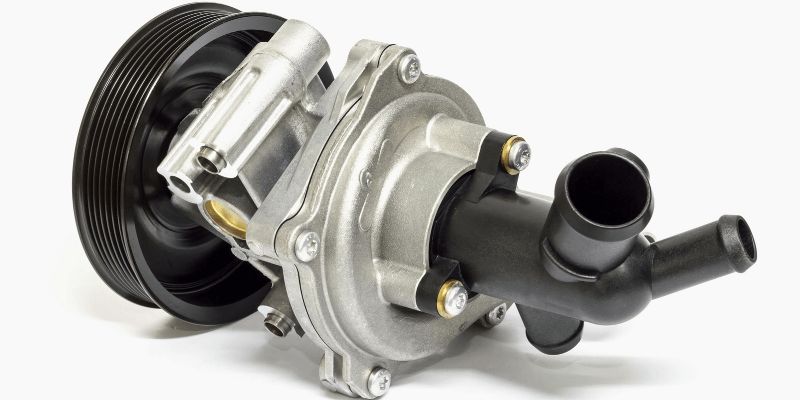
The water pump in a car is responsible for pushing the antifreeze coolant through the cooling system. The water pump sends the coolant throughout the engine, cylinder head, radiator, heater core, and intake manifold through the connecting hoses and lines. This prevents the vehicle’s engine and components from overheating and also keeps the fluid from freezing in the colder seasons. The water pump is run using a serpentine belt, drive belt, or timing belt. This will vary from different vehicle makes and models.
Maximize your fuel economy with the right maintenance and repairs with Drivesmart!
Get a Quote Today!
Bad Water Pump Symptoms: How to Tell if Water Pump is Bad
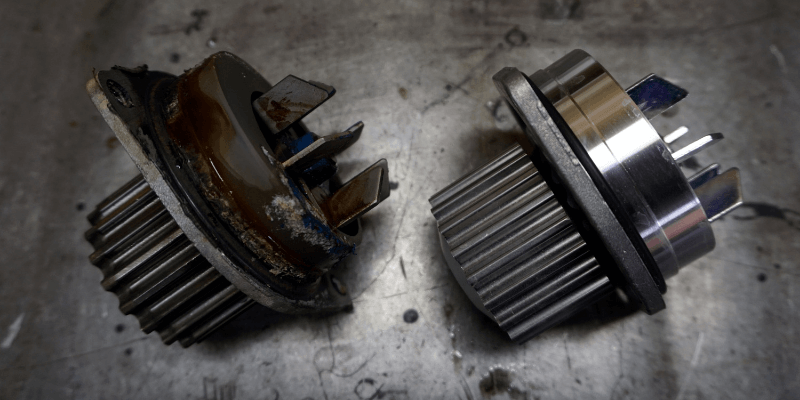
A bad water pump can be tricky to spot because the symptoms can be caused by other components in the vehicle. These are the most common water pump failure symptoms:
- Engine Overheating: Your vehicle may overheat due to problems with the water pump, radiator, thermostat, or hoses. If the engine overheats, it can result in a cracked cylinder head, blown head gasket, and burnt pistons. If not remedied quickly, this can destroy a vehicle’s engine completely. If a car is overheating, the dashboard lights will flash as a warning. The engine will also run more slowly, and the cooling system components will be hot to the touch.
- Coolant Leak: A coolant leak can come from the water pump, radiator, gasket, or hoses. A leak that is caused by a bad water pump will be evident from where the leak is dripping. If the antifreeze is found pooling beneath the water pump when the car is parked, then the pump is the source of the leak. Likewise, if the coolant is landing beneath the radiator, the leak is likely coming from the radiator.
A water pump leak is normal. It is generally due to wear and tear with regular use of the vehicle. Coolant leaks are easy to spot as the coolant will be a bright green, yellow, or red color. Coolant leaks are serious and need to be repaired quickly. When a leak is found, the component that is leaking needs to be repaired or replaced quickly.
- Whining Sound from Car: A whining noise or grinding sound is a reliable indicator of a loose water pump pulley. However, this can also be the result of a bad tensioner pulley or a slipping belt. If the water pump pulley is faulty, it can cause the bearings in the pump to wear down. If the bearings wear out, the water pump will need to be replaced.
- Steam Coming from the Engine Bay: Steam rising out from beneath the hood of a vehicle can also be attributed to the water pump, radiator cap, or the radiator itself. Steam is usually the sign of an immediate problem; meaning that the vehicle must be stopped, safely, as soon as possible. The steam indicates that the coolant is not traveling through the cooling system properly.
Water Pump Problems:
When a water pump is causing a problem, it’s best to know what the root of the issue is. If one is aware of the reason for the pump’s malfunction, one can have the situation dealt with properly and take steps to avoid similar issues in the future. Some common reasons a water pump would be failing are:
- The engine coolant has not been replaced recently enough. This creates grime and rust buildup that can ruin the water pump.
- A seal can become worn with time, causing a leak.
- The belt connected to the water pump is too taught. This puts extra pressure on the shaft and bearing; causing increased wear and leakage.
- A damaged water pump bearing inhibits the pump’s rotation. This will cause the engine to overheat.
- A gasket may have worn out over time, causing a leak.
How to Test Water Pump: How to Tell if your Water Pump is Bad
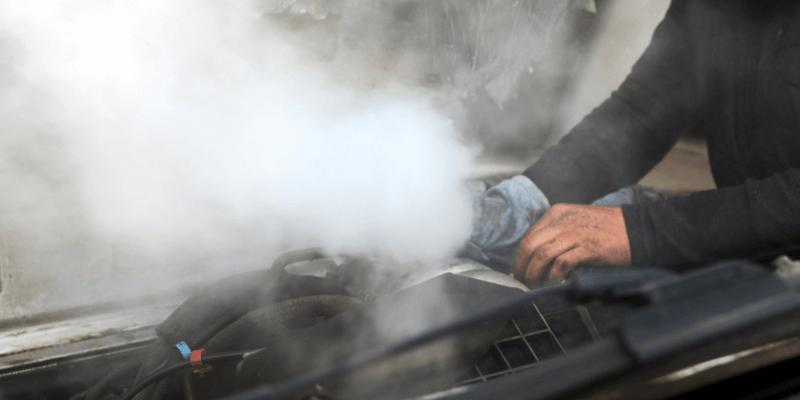
If a car is overheating or about to overheat, the culprit could be any one of the components in the cooling system. As mentioned above, the radiator, thermostat, or hoses and lines may become faulty. Any of these, including the water pump, could be the reasons for car overheating. Because these failing components will share similar symptoms, learning how to know if a water pump is bad will prove helpful in narrowing down the possibilities; saving time and money on the repair.
How to Tell if Water Pump is Working
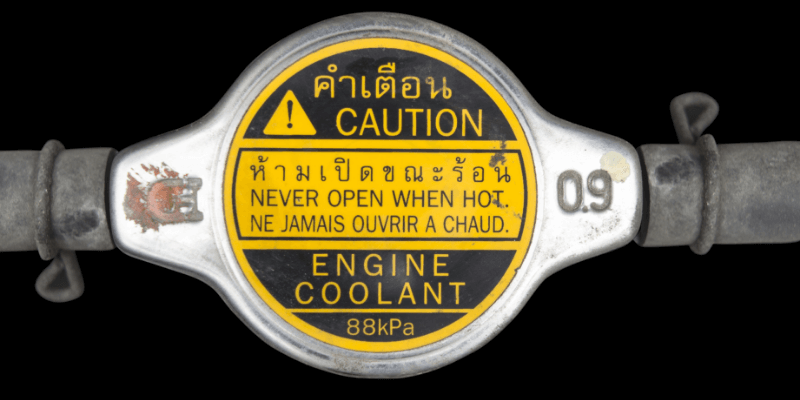
- Put the vehicle in park, remove the radiator cap, and start the engine. Let the engine run for approximately 20 minutes.
- Look into the radiator opening to see if the coolant is flowing properly. If the coolant is not circulating, this could be caused by the water pump, thermostat, or radiator.
- Replace the radiator cap and squeeze the upper radiator hose. Use a cloth or rag when squeezing the tube to prevent burning your hand. If the water pump is working, there should be a surge of coolant that runs through the hose when you release it.
- If there is no surge of coolant through the radiator hose, the coolant is not flowing properly. Turn the heater in the car all the way up. If there is little or no heat coming from the air unit, this is an additional sign that the coolant is not circulating correctly.
Water Pump Bearing: Bad Water Pump Sound
- If the water pump bearing is faulty, it will emit a squealing or grinding noise, and the pump shaft will not move properly.
- Using a long screwdriver or a length of rubber hose, you can determine if the noise is coming from the water pump; as opposed to a squealing belt.
- Place one end of the screwdriver or hose against the water pump and press your ear against the opposing end. If the bearings are worn, the squealing or grinding noise will be clear and distinct.
- Check the water pump pulley by wiggling it by hand. If there appears to be damage or excessive movement, the water pump needs to be replaced.
Water Pump Seal Leak
- If the water pump seal is broken, it will leak antifreeze coolant. A visual inspection of the water pump will expose such a leak.
- The accessibility of the water pump will vary on different vehicle models. Some may require removal of the engine cover and/or raising the vehicle.
- Once the water pump is visible, check the water pump weep hole. The weep hole will be located near the pulley; usually at the bottom of the pump. If the weep hole is damp, this is normal. Coolant dripping from the weep hole is indicative of a leak in the shaft seal.
Water Pump Replacement
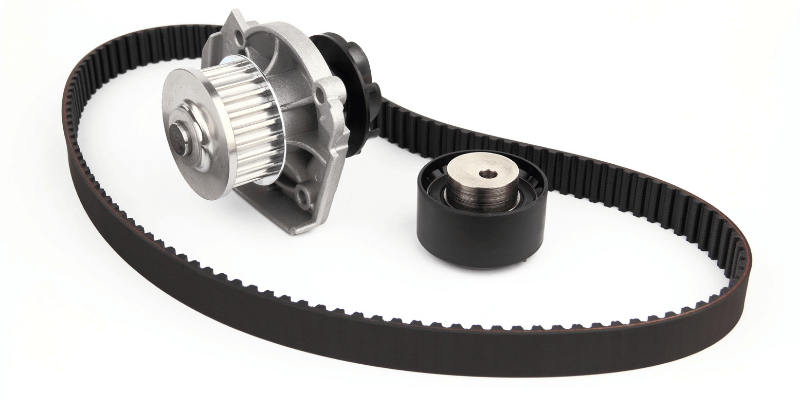
Water pump repair and replacement is a job best left to professionals. Since replacing a water pump sometimes entails removing several other components, it’s a task not recommended for beginners. If you (or someone close to you) is mechanically inclined, you might consider learning how to change a water pump.
Most professionals advise having the timing belt replaced simultaneously with the water pump. These two parts have roughly the same service life. Installing a new water pump with an old belt will increase the workload of the pump and decrease its lifespan. Similarly, putting a new belt in with an old water pump will increase stress on the belt.
Water Pump Replacement Cost: How Much is a Water Pump
Due to the amount of labor involved in replacing a water pump, the cost is estimated at roughly $700. Depending on the make and model of the vehicle, national estimates range from $300 to $800 with parts and labor included. The cost of purchase for the water pump itself ranges between $50 and $100. Professionals caution car owners that a cheap water pump may save them money upon purchase, but will not perform as well or as long as a higher quality pump.
A water pump problem is one of the many things covered under a Drivesmart powertrain plan. It is important to have your vehicle regularly maintenanced before a problem arises as preexisting issues are not covered under any protection plans nationwide. If you’re vehicle’s mileage is getting high, powertrain coverage may be the best option to protect the engine, transmission, and their adjoining components.
It’s always best to stay ahead of repair issues before they worsen. Knowing the signs of a bad water pump, or the cooling system at large, is a major benefit for vehicle maintenance. A reliable protection plan on your car will ensure that, when expensive problems arise, you’re not stuck with an unexpected financial burden.


